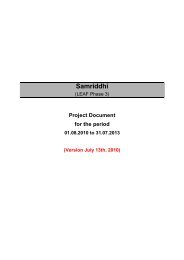Coorperation Strategy - Albania 2010-2013 - Deza - CH
Coorperation Strategy - Albania 2010-2013 - Deza - CH
Coorperation Strategy - Albania 2010-2013 - Deza - CH
Create successful ePaper yourself
Turn your PDF publications into a flip-book with our unique Google optimized e-Paper software.
SWISS COOPERATION<br />
Executive Summary<br />
<strong>Albania</strong>’s post communist transition process started<br />
in 1992 with a difficult legacy, but the country<br />
succeeded in evolving positively. Switzerland’s<br />
support to <strong>Albania</strong> already has a longstanding<br />
history with activities starting back in those times.<br />
Ever since, and especially from 1997 when a permanent<br />
cooperation office was opened, it has<br />
been supporting the country in its development<br />
agenda towards a sound and prosperous economy<br />
and a society balancing the dynamics and<br />
disparities in order to reach the standards for future<br />
European Union (EU) membership.<br />
Due to the overall positive trend, there are a series<br />
of opportunities, above all the commitment of the<br />
<strong>Albania</strong>n Government to EU integration. This is the<br />
major force for the reform process over the next<br />
years, after <strong>Albania</strong>’s having applied for EU Candidature<br />
Status. The country’s strategic framework<br />
with the National <strong>Strategy</strong> for Development and<br />
Integration (NSDI) 2007–<strong>2013</strong> and the sector<br />
strategies constitute an important tool for alignment<br />
and for donor harmonisation. This allows for<br />
a systematic building up of institutions and organisations<br />
of civil society, thus contributing to economic<br />
development. In parallel to the positive<br />
trends, some challenges also lie ahead for <strong>Albania</strong><br />
in striving to achieve the relatively demanding<br />
EU standards: at political level, the strengthening<br />
of democratisation and ongoing decentralisation;<br />
at economical level, the maintenance of positive<br />
growth trends, the improving of basic infrastructure<br />
and increasing private sector participation;<br />
and at social level, the strengthening of civil society,<br />
promoting women and especially marginalised<br />
groups like Roma.<br />
Tangible results have been achieved during the<br />
period covered by the “Swiss Cooperation <strong>Strategy</strong><br />
2006–2009 <strong>Albania</strong>” (and already during<br />
earlier times) in regard to the portfolio which covered<br />
three domains: Democratisation and Decentralisation,<br />
Private Sector Development, and Basic<br />
Infrastructure and Social Services. The comparative<br />
advantage of Swiss cooperation was well<br />
recognised as a result of its dedication, specific<br />
know-how, and experience, thus being perceived<br />
as a reliable and flexible partner.<br />
The strategic orientation of Swiss Cooperation<br />
<strong>2010</strong>–<strong>2013</strong> concentrates on two domains of intervention<br />
fully aligned with the relevant national<br />
documents, the NSDI 2007–<strong>2013</strong>, and subsequent<br />
sectoral and crosscutting strategies. It entails<br />
two domains with related sub-domains:<br />
• Democratisation and Rule of Law<br />
– Democratisation and Decentralisation<br />
– Social Inclusion<br />
• Economic Development<br />
– Economy and Employment<br />
– Infrastructure<br />
The transversal themes have been identified as<br />
gender and governance, respectively economic<br />
governance, and the environment.<br />
Switzerland will thereby give an even stronger<br />
thematic focus to its portfolio which is fully in line<br />
with <strong>Albania</strong>’s vision as a democratic country of<br />
a high living-standard integrated into European<br />
structures. It will consolidate its engagement of the<br />
past and allow, at the same time, for innovations.<br />
A special focus is put on sustainability through a<br />
programme approach and, in parallel, on the<br />
use of synergies between activities of the Swiss<br />
Agency for Development and Cooperation (SDC)<br />
and the Swiss State Secretariat for Economic Affairs<br />
(SECO).<br />
Switzerland already sustains cooperation in the<br />
region in private sector development, research,<br />
culture and governance, and wants to share<br />
knowledge gained in <strong>Albania</strong> with other parts of<br />
South Eastern Europe.<br />
A certain number of principles will guide Switzerland<br />
in order to enhance aid effectiveness when<br />
implementing this new cooperation strategy, and<br />
to allow for a strategic monitoring and accounting<br />
for results.<br />
On an average, Switzerland (SDC and SECO)<br />
will provide, over the next four years, grants of<br />
about <strong>CH</strong>F 14 million/year (equivalent to almost<br />
10 million Euros annually).<br />
4

















